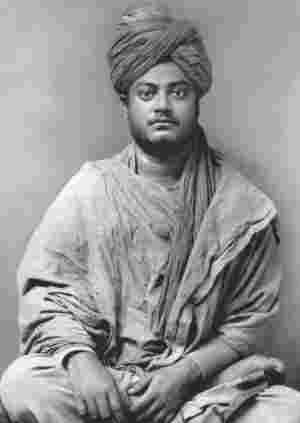SelfDefinition.Org
The Vedanta Philosophy
Lecture given in 1896 by
Swami Vivekananda
(1863-1902)

Introduction and Note
Introduction
by Charles Carroll Everett
THE SWAMI VIVEKANANDA was sent by his friends and co-religionists to present their belief at the Congress of Religions that was held in connection with the WorId's Fair in Chicago. This he did in a way to win general interest and admiration. Since then he has lectured on the same theme in different parts of our country. He has been in fact a missionary from India to America. Everywhere he has made warm personal friends; and his expositions of Hindu philosophy have been listened to with delight. It is very pleasant to observe the eager interest with which his own people in India follow his course, and the joy that they take in his success. I have seen a pamphlet filled with speeches made at a large and influential meeting in Calcutta, which was called together to express enthusiastic approval of the manner in which he has fulfilled his mission; and satisfaction at this invasion of the West by oriental thought. This satisfaction is well grounded. We may not be so near to actual conversion as some of these speakers seem to believe; but Vivekananda has created a high degree of interest in himself and his work. There are indeed few departments of study more attractive than the Hindu thought. It is a rare pleasure to see a form of belief that to most seems so far away and unreal as the Vedanta system, represented by an actually living and extremely intelligent believer. This system is not to be regarded merely as a curiosity, as a speculative vagary. Hegel said that Spinozism is the necessary beginning of all philosophising. This can be said even more emphatically of the Vedanta system. We occidentals busy ourselves with the manifold. We can, however, have no understanding of the manifold, if we have no sense of the One in which the manifold exists. The reality of the One is the truth which the East may well teach us; and we owe a debt of gratitude to Vivekananda that he has taught this lesson so effectively.
C. C. EVERETT.
Harvard University.
Publishing Note
This lecture and the discussion which followed were stenographically reported. They could receive from the Swami only a cursory revision, owing to his departure for England, but it is hoped no errors have crept in. Professor LANMAN and Professor WRIGHT of Harvard have kindly assisted in the final revision. In the reporting of the discussion, some of the questions were unavoidably lost. The first four notes were added by the Swami. In the original lecture, the quotations from Hindu writings were first given in the Sanskrit, and then translated; these offhand translations stand as given.
Following the lecture and discussion, are the answers of the Swami to questions at two afternoon talks with some Harvard students, on March 22 and 24. These answers were stenographically reported, but the questi1ons were not. There have also been added a few selections from unpublished lectures. Some of the answers and selections cover the same general ground, but they have all been retained on account of the variety in treatment. While no adequate exposition of the Vedanta philosophy can be given in a single address, it is hoped that this, with the accompanying answers and selections, will be of value to those interested in the thought and life of the East.
J. P. F.